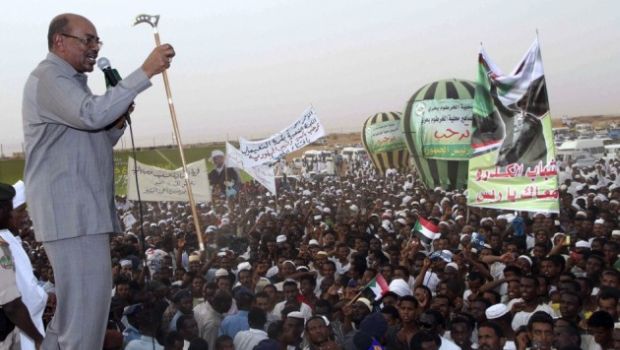The Sudanese people on Thursday celebrated the 59th anniversary of national independence but without any feelings of optimism that there will be any real change to their political, economic and living conditions in the near future. All promises of change made since Omar Al-Bashir’s famous speech last January, dubbed the Wathba or Leap speech, in which he called for comprehensive national dialogue, have vanished as a climate of tension and frustration dominates the scene at the start of 2015.
Soon after some factions rushed to respond to the call, the opposition realized that this was a mere tactic on the part of the regime to improve its image and legitimize the forthcoming presidential and legislative elections. Moreover, they realized that this hoped for change would not be achieved, nor could the regime be dismantled by peaceful means as some had believed. Former Sudanese Prime Minister and leader of the opposition National Umma Party Sadiq Al-Mahdi acknowledged this fact recently and has been quoted as saying that his party made a mistake in joining the Wathba dialogue, claiming that his good faith had blinded him from seeing the dialogue’s flaws.
Today, the political map of Sudan looks like this: On one side, there is the regime and political parties that evolved from and remain organically linked to the government. On the other side stand the opposition forces that signed the so-called Nida Sudan (Sudan’s Call) last month, pledging to dismantle the regime peacefully and calling for a public uprising. Squeezed in the middle are the majority of the Sudanese people who are hoping for real change that moves the country from its current state of deterioration to stability. The public, however, are afraid that the situation will remain deadlocked between the Islamists who will seek to cling to power whatever the price and the opposition which has, so far, failed to make any effective steps due to chronic internal disagreements. The gap between Sudan’s opposition and the general public is only widening with the Sudanese people having grown tired of the opposition’s inaction.
This year could be a test for all sides. The government and opposition are both closing ranks in anticipation of change that may come, be that before or after the presidential and legislative elections. While the government insists on holding the elections in April, the opposition is calling for them to be postponed, insisting that free and fair elections should be conducted under the supervision of a new national government. This new government would oversee a transitional period during which a new constitution could be drawn up and fighting stop in order to ensure the country’s transition into a new democratic phase that involves all sides and puts an end to conflicts. Parallel to this political battle, war rages on in Darfur, South Kordofan and the Blue Nile. In fact, this violence is only expected to escalate due to the government’s ongoing military campaign, dubbed “Decisive Summer,” in which it aims to defeat armed movements and even threaten South Sudan, which Khartoum accuses of supporting the rebels.
The third battle is on the economic front. Sudan’s economy continues to deteriorate, affecting the living conditions of the vast majority of people while corruption gnaws at the state. The government’s promise to compensate for the losses that resulted from losing more than 80 percent of its oil revenues following South Sudan’s secession have failed to achieve anything. Talk about the exploration of gold and the export of tons of the precious metal to repair the budget deficit no longer convince the public who have been angered as prices of basic commodities continue to skyrocket, preventing them from meeting their living needs. News is circulating in Khartoum of people committing suicide in a manner reminiscent of Mohamed Bouazizi of Tunisia. Nevertheless, the Sudanese President continues to reiterate that the conditions that led to the eruption of the Arab Spring uprisings do not exist in Sudan.
Official statistics say that approximately 47 percent of the population of Khartoum are living below the poverty line, and the percentage increases to 69 percent in other areas of Sudan, such a Kordofan and Darfur. The Ministry of Labor estimated the number of unemployed to be at approximately three million—48 percent of whom are university graduates. It was not surprising that thousands of youth rushed to the Qatari embassy in Khartoum after it announced just six job vacancies in Doha a few weeks ago. The Sudanese people are waiting for any opportunity to migrate in search of work.
The Secretariat of Sudanese Working Abroad, an official body in charge of the affairs of Sudanese expatriates, announced recently that more than 68,000 nationals went to work abroad last year. The director of the secretariat said that the number of Sudanese people living abroad, estimated at four million, is constantly on the rise. However, many believe the true number is much larger as some migrants are unregistered or have either been granted asylum or are working as illegal migrants.
As we enter 2015, it is clear that the situation in Sudan is on the verge of some very serious developments, and perhaps surprises.

Trackbacks/Pingbacks